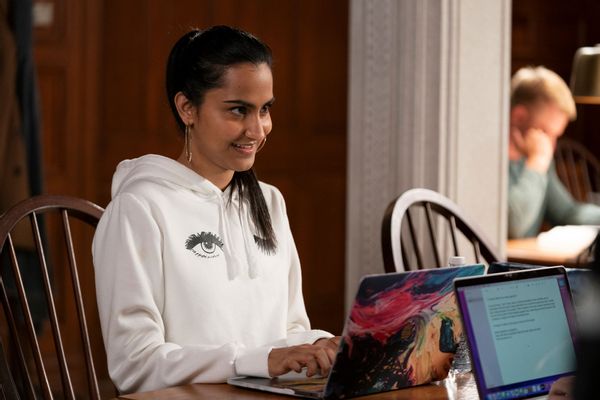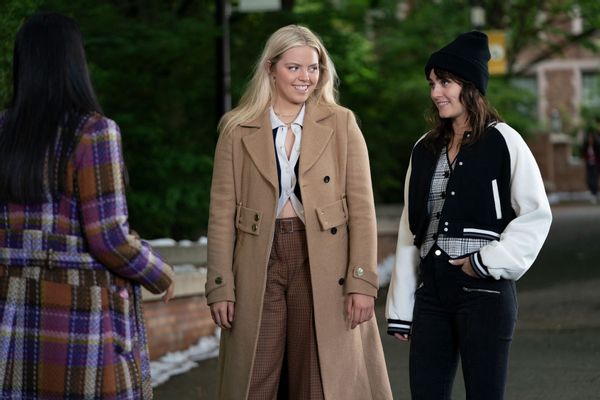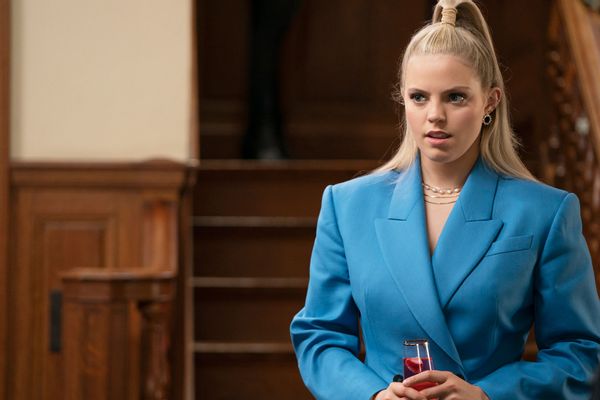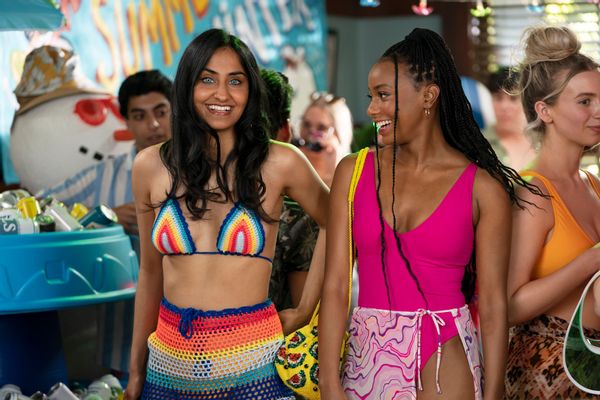“Sex Lives” stars on how their characters are “more powerful” in their sexuality this year
School is officially back in session on “The Sex Lives of College Girls,” HBO Max’s lauded comedy-drama created by Mindy Kaling and Justin Noble. And as expected, our favorite quartet have their fair share of messes to mend in the show’s second season.
Upon their return to Essex College after Thanksgiving break, the four friends are navigating yet another horny and eventful semester on campus. And even though it’s only been a few months for them, we’re already starting to see growth, specifically with privileged Leighton Murray (Reneé Rapp) and jokester Bela Malhotra (Amrit Kaur).
“I was able to be a part of a coming-out scene that was accepting … It’s really f**king cool to have that be such a big part of my life.”
Leighton has officially come out to all of her roommates after previously telling Kimberly (Pauline Chalamet) that she’s gay. Now, she’s confident in her sexuality and identity: the new Leighton has her face in full view on her dating app profiles, pursues women she’s into and freely enjoys casual sex, even though she unknowingly lands herself in a sticky situation. She also develops a newfound crush on a tennis player named Tatum (Gracie Dzienny), who is basically a slightly older version of herself, and attempts to woo her on the court, albeit unsuccessfully. Nevertheless, the pair’s future seems promising after they exchange numbers at a party.
As for her relationship with her roomates-turned-besties, Leighton softens up to the girls and ditches her more ice queen-like persona to showcase her vulnerable side. There’s a handful of heartfelt moments where she’s seen comforting them, giving them well-meaning advice and stepping in to help them amid difficult situations.
Meanwhile, Bela, the sex-positive, aspiring comedy writer is focused on advancing her career after leaving her position at “The Catullan” to launch her own female-only comedy magazine. Despite her strides, Bela is once again deemed insufficient and realizes just how difficult it is for her to break into such a male-dominated industry. She eventually works as a student liaison for a well-known comic named Dan O’Connell (John Reynolds of “Search Party”), who she tries to impress in order to land a gig on his show. But her chance at success is jeopardized after Eric (Mekki Leeper), her ex-editor and now boyfriend, hits it off with Dan at the aforementioned party.
“At the end of Season 1, Bela deals with so much. She’s gone through sexual assault. She’s had so many people say terrible things about her, name-call her. She’s left ‘The Catullan.’ And she goes through Thanksgiving break, comes back and decides that she’s going to go into revenge mode — at least that’s the choice I made as an actor,” Kaur explained. “That she now is going to objectify men. She’s going to be more boyish. She’s going to be alpha. She’s going to be a boss. And in this ambition of not wanting to feel her pain, she unknowingly hurts a lot of people.”
Salon recently had the pleasure of virtually chatting with both Rapp and Kaur about how they prepared for their roles, what their characters mean to them and why it’s important to showcase female sexuality — specifically focused on queer and South Asian women — on screen.
This interview has been edited for length and clarity.
I’m curious, Amrit, if you’ve had any conversations with Mindy Kaling about being a woman in comedy to help prepare for season two. If so, what were those conversations like?
Amrit Kaur: We didn’t have any one-on-one discussions about that, but I did a lot of research into watching “The Mindy Project,” looking into her work in “The Office,” seeing what her mind was like and where she was coming from. A lot of the cast members who are in my comedy group actually were in the comedy magazines in their respective universities. So, there was a lot of research asking them. I did watch a lot of stand-up comedians do work. I went out and did some stand-up shows in between as a rookie, just to get into that mechanism of where Bela’s always trying to map out and create jokes. So, not a specific conversation with Mindy.
“Right now, we’re talking about the broad strokes of having a sexual character in Hollywood that’s South Asian American because we’re still behind.”
But if I look at all the things that are the deepest parts of me, as to why I behave certain ways, why I’m desperate for love, why I want to be funny, why Bela wants to be funny because she doesn’t feel as attractive. So, she thinks that being funny is going to make her hotter. All of these things, if I reveal in myself, then I’m sure I’m touching Mindy somewhere as well and revealing her in a way.
 Amrit Kaur in “The Sex Lives of College Girls” (Photo courtesy of HBO Max)
Amrit Kaur in “The Sex Lives of College Girls” (Photo courtesy of HBO Max)
Reneé, I really appreciated Leighton’s coming-out scene. I’m curious how you interpreted that scene and also prepared for it?
Reneé Rapp: Something that is not lost on me is that I was able to be a part of a coming-out scene that was accepting. It was basically like me being able to come out all over again and really just be blindly accepted no matter what. Really the only thing that went into it was I just was like, “OK, I just really got to drop in and be vulnerable and be myself.” And we cried in so many of those takes because I’ve been out for so many years, but it’s still so emotional to me. It means a lot and it’s really f**king cool to have that be such a big part of my life. I’m very lucky.
 Amrit Kaur, Reneé Rapp and Alexia Loannides in “The Sex Lives of College Girls” (Photo courtesy of HBO Max)
Amrit Kaur, Reneé Rapp and Alexia Loannides in “The Sex Lives of College Girls” (Photo courtesy of HBO Max)
This season, we see Leighton and Kimberly’s friendship develop as they spend more time together and grow closer. They share a series of intimate moments in the bathroom when Leighton helps Kimberly take her hormone injections. And Leighton even accompanies Kimberly to her surgery and comforts her beforehand. What was it like working with Pauline and how did you both work together to bring your characters’ dynamic to life?
“Holy s**t, how do I do this right and also get over my imposter syndrome?”
Rapp: I think the four of us all just gel so well together that it feels so good. And, you know what I was so excited about? I was so excited to come out to all three of them together. That was so cool to me. Because I shared such an intimate moment with Kimberly last season and it was this real pour-out of emotion and going through 10 things at once. And what was so special was that growth was made so quickly to be like, “No, I’m gonna come out to all of you, and I’m gonna actually feel good about it.” And so, it felt really great to be able to develop that relationship with all of the girls, especially after sharing such a personal moment with Kimberly last season. It really pushed Leighton forward in the fact that like, “OK I’m gonna do this.”
I really loved your characters’ growth, especially as they embrace and showcase their sexuality more. How important do you think it is to show and portray young women – whatever their identity or sexuality – who are unapologetically taking control of their sexuality?
Rapp: I think it’s wildly important, on levels that I probably can’t even put into words. I also think it’s important to note that Leighton’s experience and my queer experience is not the sole queer experience. I think a lot of times I get asked, “Do you think Hollywood is progressing in this way that we have queer characters on screen and things like that?” And though I completely agree, I’m always very timid to respond to that question with a lot of gusto without taking away from what we actually have accomplished. Because, again, this is not the sole queer experience. And there are thousands of other queer experiences that even Leighton could learn and take notes from a lot. So I feel very lucky to be a part of that for a lot of people. And I just hope that it doesn’t end there. It’s very comforting for a lot of people to see a queer character and a gay character out and about. It’s also really important that that’s not the only experience and that’s not the only story that is told in a digestible and palatable way. So I feel both ways about it. I feel very grateful and very excited and eager. And hopefully we have more.
“Bela has allowed me to be myself in many ways: explore my sexual self without labels, be the fashionista, be the comedian that I am and have the confidence that I have.”
Kaur: I think it’s so critical because South Asians are humans, like any other culture. And right now, I’m seeing more representation of South Asians in Hollywood. But there’s so many cultures within South Asia, let alone India. Every state has a language, a dance, a different expression. And eventually, you’d like to get to a place where the representation in North America is even more specific. But right now, we’re talking about the broad strokes of having a sexual character in Hollywood that’s South Asian American because we’re still behind. I would like to get to a place where that’s just normal. She’s a normal human and she is just like anybody else. And I just want to add as well that her exploration of sexuality is not akin to every South Asian American’s exploration of sexuality. And it’s because we don’t have that many right now. We look at these characters as excitement, but that’s just one approach and that’s great. But there’s so many other experiences and those all, one day, should also be brought to light.
Were there any specific challenges or difficulties that you came across while playing Leighton?
Rapp: Anxiety is a huge one, which is my own specific challenge, of course, but I feel like I want to do a really good job. Not only on myself as an actor, but I’m so grateful to everyone queer in my life. And my friends who are queer in any sort of identity have shaped who I am and changed who I am as I’ve gotten older and as I’ve continued to sort of deep dive into my identity. And so I think the biggest fear and the biggest tactic comes from, “Holy s**t, how do I do this right and also get over my imposter syndrome?” I’ve earned this space. I am OK to exist here. Because a lot of times I’m like, “Ah, no, no, no. I’ve done horrible things. I’m a bad person. I don’t need to be here. I can’t act.” I will just spiral, spiral. And so that was a big thing for me to overcome this season. And I don’t know that I’ve overcome it yet to be quite honest, but we’re getting there. I will let you know when I do.
 Reneé Rapp in “The Sex Lives of College Girls” (Photo courtesy of HBO Max)
Reneé Rapp in “The Sex Lives of College Girls” (Photo courtesy of HBO Max)
What does playing Leighton and Bela mean to you? Are there any specific things about them that you either like or dislike?
Rapp: It’s so funny that Leighton has become such a big part of my life because I never foresaw myself acting in this capacity, nor did I really see myself having a character become such an influential part of who I am. Being afforded the opportunity to come out so publicly and to have that scripted in such a way that is not only accepted, but even oftentimes, is praised by fans and the outside community — that’s the biggest “I am doing OK” boost ever. It is the coolest thing and it is not lost on me that that is a huge f**king blessing to be able to have that sort of acceptance literally written in and then also received by a community that I feel so close to and that I craved acceptance from as a kid. It’s such a crazy part of like, “Ah, somebody please tell me that I am in here and I’m accepted and you’re with me.” And now I’m so stupid lucky to have that from so many people and vice versa. So she’s become a huge part of my life. And I’m very grateful for the opportunity to play her. I’m very grateful that people even slightly give a f**k. That is so wild to me.
Kaur: God, I mean, Bela . . . what is it like being myself? It’s my goal in every character that I play, that I was able to be myself. Elia Kazan has this beautiful actor’s vow, “The thing I want most and need most is to be myself, and it’s an actor’s battle.” And Bela has allowed me to be myself in many ways: explore my sexual self without labels, be the fashionista, be the comedian that I am and have the confidence that I have. She’s introduced me to stand-up. So she’s allowed me to be myself because she’s been brave in being herself.
What do you hope viewers will take away from Bela’s storyline this season?
Kaur: I think she’s more powerful in her sexuality this year. I think last year she was more flighty. And this year, we’re seeing a character — Indo-American character — who’s very grounded and very intelligent. And there are episodes where she fluctuates and goes back, but you can see that she’s becoming more intelligent. Kalinda Sharma in “The Good Wife” was one of the few South Asian American characters I saw that was very confident in her sexuality. So, I hope it will encourage not only South Asian Americans but a lot of children, who’ve been told culturally otherwise they can’t be, to be confident and to explore confidence in their sexuality.
 Amrit Kaur and Alyah Chanelle Scott in “The Sex Lives of College Girls” (Photo courtesy of HBO Max)
Amrit Kaur and Alyah Chanelle Scott in “The Sex Lives of College Girls” (Photo courtesy of HBO Max)
“The Sex Lives of College Girls” is streaming on HBO Max. Watch a trailer for the new season below, via YouTube:
Read more
about “The Sex Lives of College Girls”

